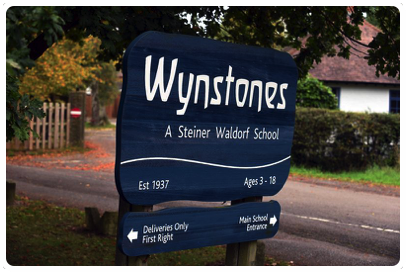The Underlying Principles of Steiner Education

Ofsted ruffled a lot of feathers at the end of 2018 and the beginning on 2019 by concluding that three of the four state-funded Steiner-Waldorf schools in the UK were ‘Inadequate’, due to serious safeguarding issues. This has led to a backlash from many parents whose children attend these schools.
The fact only one state funded Steiner-Waldorf school, the one based in Hereford, is still rated ‘Good’ could well be because its own issues with safeguarding haven’t yet come to light. We are personally aware of a handful of shocking testimonials, but the parents we communicated with are too scared to speak out publicly, and so no one can know what happened to their families at that school.
But it’s important to understand that the inability of Steiner-Waldorf schools to keep children safe has nothing to do with them being state funded. As we’ve said time and again, the issue lies with the pedagogy, a pedagogy rooted in a belief in karma, reincarnation, angels, and demons, and a willingness to damage children and entire families in service of these pseudoscientific beliefs over the century since its inception.
Special Treatment
The wealth of evidence for this damage is, however, glaringly at odds with the more positive inspection reports received by independent British Steiner-Waldorf schools. These reports weren’t conducted by Ofsted, but by the School Inspection Service.
These schools are deliberately shrouded in mystery; what they portray to the public isn’t what’s actually going on there. But don’t take our word for it. Here is what the founder of these schools and of their philosophy, Rudolf Steiner, admitted on the 5th of February 1924:
“We are working toward threefolding, but we have to remember that an institution like the Independent Waldorf School with its objectively anthroposophical character, has goals that, of course, coincide with anthroposophical desires. At the moment, though, if that connection were made official, people could break the Waldorf School’s neck.”

On the 6th of November 2018, Amanda Spielman, Her Majesty’s Chief Inspector of Ofsted wrote a letter to The Rt Hon. Damian Hinds MP, Secretary of State for Education.
She explained her concerns regarding the companies used by the government to monitor and inspect independent schools, the Independent Schools Inspectorate (ISI) and the School Inspection Service (SIS).
She was worried that her ability to monitor the work of the inspectorates was being seriously hampered by the existing commissioning arrangements:

“My inspectors have not had access to the evidence bases gathered during these inspections, and as such, have been limited to making an assessment about whether the report is internally coherent. They cannot make any assessment of how the inspection was conducted, what evidence was gathered, and whether it supports the judgements made. Additionally, the two inspectorates have not provided Ofsted with sufficient management information of their inspection activities, for example the profile of grades being awarded to be able to review overall inspection outcomes. This level of evidence and information is clearly not sufficient to provide for an objective assessment of the quality or standards of their inspections.”
She concluded that “the system is not currently configured so that any problems can be spotted and tackled, for example regarding potential safeguarding issues in the schools.”
“Additional Scrutiny”
This lead the Secretary of State for Education to respond on the 15th of that month: “The incidence of safeguarding issues in the independent Steiner schools appears to be higher (in about 30% of the schools, over the last inspection cycle) than the average for safeguarding failures in the non-association independent schools inspected by Ofsted (about 10%)”, he stated.

He agreed with Ms Spielman that “there should be additional scrutiny to examine the situation”, and suggested that Ofsted should directly inspect some independent Steiner-Waldorf schools rather than let SIS do it.
One of the first private Steiner-Waldorf schools to be inspected by Ofsted was Wynstones on the 27th of November, less than two weeks later.

When it was inspected by SIS in January 2016, it was rated as ‘Good’, and the “Safeguarding and child protection are very well managed. Staff have made good working Inspection relationship with the Local Authority Designated Officer. Clear concise records are maintained of any actual and/or potential safeguarding issue.”
But when Ofsted did its own inspection, less than three years later, the school was rated as ”Inadequate”: “The safeguarding culture in the school is weak. Leaders, managers, staff and trustees do not protect children from harm. Statutory safeguarding guidance is not fully understood or followed.”

Disturbingly, “Despite assurances from the school that no restraints had occurred, inspectors found that on two occasions untrained staff had restrained children. This poor practice leaves children and staff at risk.”
Even the administrative side of the school was found to be wholly inadequate: “Documents relating to child protection matters, behavioural incidents and boarding arrangements are disorganised, poorly written and often incomplete. Consequently, leaders and managers are unable to use this information effectively to keep children safe.”
Deeply Concerning Findings
Wynstones was just one of eleven Steiner schools Ofsted recently inspected as a result of the above communication. Ms Spielman gave her findings to Mr Hinds on the 31st of January 2019.

In that letter, she stated that “Six of the nine ‘overall effectiveness’ judgements from full inspections were inadequate and three were requires improvement.”
Her analysis was that “Overall, the findings are deeply concerning. They demonstrate that there are a number of areas of common weakness in these schools, which mean that in many cases, the children attending them are inadequately safeguarded and are receiving a poor quality of education.
“At the root of many of the weaknesses are poor leadership, management and governance. Many of the schools inspected lack clear lines of responsibility and, too often, senior leaders do not hold staff to account, while governors fail to fulfil their role in holding school leaders to account. In the worst cases, senior leaders and governors have created a culture in which it is difficult for parents to raise their concerns, and some parents who have made complaints to Ofsted or to the school have felt ostracised and intimidated by school leaders.”
Common Failures of Underlying Principles
Looked as a whole, those investigations are devastating for Steiner-Waldorf schools. This is actually nothing new to those who have researched this pedagogy, and the resulting effects on families around the world:
“The consequences of these failings for pupils are serious. Inspection identified that many of the schools do not identify and address safeguarding risks effectively. Some do not have in place even the basic systems needed to safeguard children. For example, some of the schools did not have an adequate system for maintaining an accurate admissions register, while others had not made sure that staff are suitable and safe to work with children. In the worst cases, inspectors witnessed inappropriate physical handling of children and a failure to make appropriate referrals to the local authority when pupils were clearly at risk of harm. My inspectors also found instances where the approach to safeguarding protected staff rather than children, because senior leaders and governors failed to address serious complaints from parents about a member of staff.”

Steiner-Waldorf schools have a reputation for being a better, more positive and nurturing place to educate children with special educational needs. These reports paint a very different picture: “Inspectors too often noted a poor approach to the provision for children with special educational needs and/or disabilities (SEND), a lack of understanding of their needs and inadequate support provided. In some of the schools we inspected, children with SEND were found to be disproportionately excluded or absent. At one of the schools found to be inadequate in all areas, inspectors reported that some staff and senior leaders blamed pupils with SEND for all the problems in the school.”

Perhaps more important though, is the possibility that someone in a governmental position is finally getting it: “Given the prevalence and seriousness of these issues across both state-funded and independent Steiner schools, they raise questions about whether these common failures are a result of the underlying principles of Steiner education,” wrote Mr Spielman.
Mr Hinds also expressed his keenness to make progress on “the thematic analysis”.
When one of the marked characteristics of these schools is that “Pedagogical methods [are] used in dealing with discipline”, should it really come as such a surprise to anyone that the safeguarding issue lies with the anthroposophical pedagogy?
SIS was heavily criticised in Ms Spielman’s January letter as well: “The results of our monitoring work of SIS also gave me cause for concern: the inspections we monitored lacked rigour, particularly in relation to safeguarding. However, I am aware that SIS has taken the decision to cease operating.”
According to a statement by the SIS board of directors, they had decided to cease to inspect schools in England and Wales back in September 2018, and that “this decision would be implemented with effect from the 1st January, 2019 and the appropriate bodies were notified.”

It’s Not What It Looks Like
For years, Steiner-Waldorf schools have argued that only inspectors with a background in Steiner Education and therefore a knowledge of Anthroposophy can properly inspect them. Someone not versed in the above would therefore misunderstand how the staff are looking after the children in their care. It’s as if they expected us to believe that safeguarding children was done in such an unusual way that it would not look as such to outside observers. This twisted logic has worked for decades.
It seems that SIS excelled at protecting these schools and their esoteric philosophy at the expense of the pupils and their families.
Could it finally be time to ”break the Waldorf School’s neck.”?
the photo of the Wynstones school sign was taken from Gloucestershire Live
